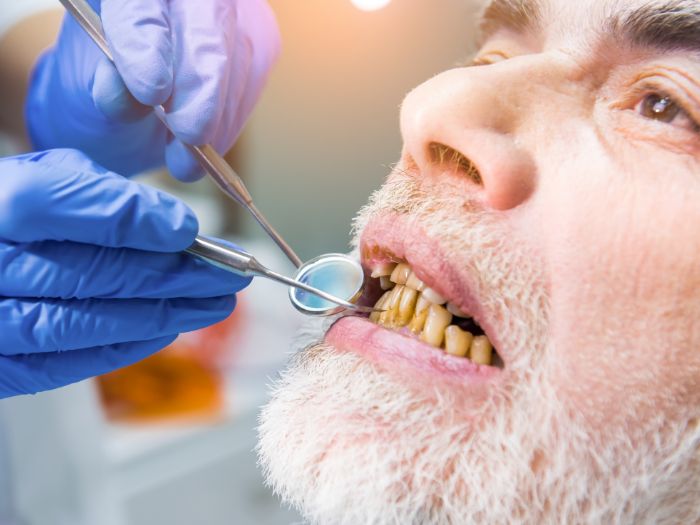While initially advertised as a smoking cessation device, vaping and e-cigarettes are no better. When you need motivation to quit, consider the relationship between tobacco use and your teeth.
How Smoking and Tobacco Use Affect Your Teeth
Tobacco use has a pervasive effect on your mouth and dental health:
- Tobacco influences how well gum tissue attaches to bone and alters how the gum tissue cells function. This causes the gums to pull away and expose the roots below. Among early issues, tobacco users start to experience increased tooth sensitivity.
- As these relationships break down, smokers see increased rates of mouth infection due to slower tissue repair and decreased blood flow. Many smokers develop periodontal disease.
- This progression eventually causes teeth to loosen and accelerates jawbone loss.
- Contrary to certain beliefs, smokeless tobacco products are not safer than cigarettes. Instead, they expose your mouth to nicotine and chemicals that can contribute to oral, throat and esophageal cancer.
- Smokeless tobacco products can also have a gritty texture, which contributes to tooth wear and erosion.
As a result of these factors, tobacco use materializes as:
- Discolored teeth and tongue
- A greater plaque and tartar presence
- Jawbone and tooth loss
- Patchiness within the mouth – a condition known as leukoplakia
- Chronic bad breath
- A higher failure rate for restorative dental procedures
- Elevated risks for complications following dental procedures
- Increased risks for gum disease and various cancers
Common Dental Issues Related to Tobacco
From chewing to smoking, all forms of tobacco use can contribute to the following dental issues:
- Cancer: The most significant concern, chewing and smoking tobacco increases your risk for developing cancer of the mouth, tongue, cheek, lip, gums or esophagus. Rates for smokers are about 60 percent higher than for non-smokers. The longer a person smokes or chews tobacco, the higher these risks become. Continuing these habits after treatment greatly increases the chances the cancer will return.
- Mouth Lesions: Years before a cancer diagnosis, you may start to see lesions in and around your mouth that eventually become malignant.
- Cavities: Short term, chewing tobacco exposes your teeth to sugar, which increases risk for cavities.
- Gum disease: The combination of routinely chewing tobacco and putting off dental checkups increases your risk for gum disease. Smoking further causes the mouth to develop bacterial colonies that accelerate the development of gum disease and slow tissue healing. These factors can lead to tooth loss, which progresses to jawbone loss.
- Staining: Perhaps one of the more obvious aesthetic effects, smoking and chewing tobacco give your teeth a distinct yellow color that gradually turns to brown. The tar and nicotine content in cigarettes makes this effect more pronounced.
Vaping might remove tobacco and tar from the equation, but the habit still affects your teeth. Individuals who vape regularly have higher rates of cavities, gum disease, gum recession, tooth sensitivity, and tooth loss, and are more likely to develop to grind their teeth. Fires and explosions also due to e-cigarette use can cause tooth damage and bone fractures.
Quitting and Dental Health
Those who cut back on, if not quit, tobacco use see risks for gum disease, oral, and other area cancers decrease and start to experience fewer mouth lesions.
As many current and former smokers know, quitting is no easy task and often involves a multi-part intervention, including nicotine-replacement therapy overseen by a medical professional and counseling. Your dentist may further aid your efforts in varying degrees by recommending:
- Nicotine gum
- Whitening toothpastes and other over-the-counter products to lessen staining and help improve the appearance of your teeth
- Mouthwash to target chronic bad breath.
- Routine checkups to identify gum disease, lesions, and any loose teeth or jawbone loss.
- A thorough examination of your tongue, throat, and cheeks to check for early signs of cancer.
- Cosmetic dentistry and restorative procedures to address more severe discoloration and damaged or loose teeth.
To discuss your efforts to quit smoking and your dental health, contact our Shelton office today.

